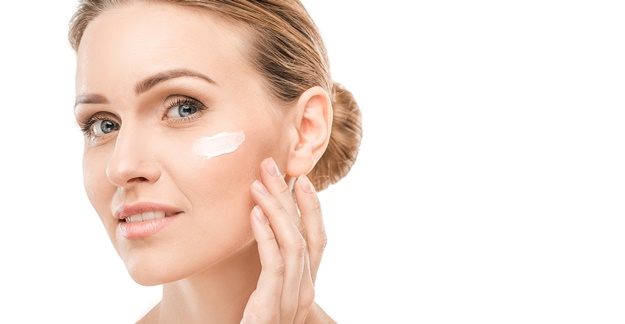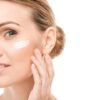Billions of dollars a year are spent on skin products that claim they can slow the aging process. Which ingredients in those products actually work?
Every year, people in the United States spend over $9 billion on cosmeceuticals – products that, when applied to the skin or taken as oral supplements, promise everything from a youthful glow to the eradication of age spots, wrinkles and fine lines. When University of Michigan researchers surveyed patients in the dermatology clinic, they found that 53% had used anti-aging treatments in the past, while 66% said they were interested in future anti-aging treatments. The results of the survey were published in 2017 in the Journal of Cosmetic Dermatology.
The most popular anti-aging skin product – preferred by dermatologists and used more often than any other products by consumers – is sunscreen. Exposure to the sun’s rays (also referred to as “photo aging”) puts skin at risk for aging ahead of schedule. There are several active ingredients in sunscreens that can be detected in the blood after 24 hours of use as per a recent study by JAMA. Though the ingredients may not cause harm, further investigation of its effects is required. If you use a sunscreen especially on acne-prone skin, make sure that you first test it by slightly dabbing it on your skin and checking it for 24 hours to make sure that you don’t get any allergic reactions to it.” Madison Valgari, Mom Curls
However, any decisions about anti-aging products beyond sunscreen are difficult, with a host of ingredients and unsubstantiated claims competing for consumers’ cash. The University of Michigan research team found that worries about side effects of treatment and the cost of treatment prevented many people from trying anti-aging products.
Intrinsic vs Extrinsic
“Aging in the skin takes two forms, intrinsic and extrinsic. Extrinsic aging is almost exclusively from UV [ultraviolet] light exposure and results in collagen and elastin degradation, pigment and blood vessel irregularities such as spots and broken blood vessels, and wrinkles. Intrinsic aging is mostly things like cell senescence [deterioration with age], which leads to things like skin and collagen thinning… and an altered skin barrier that doesn’t ‘hold’ moisture,” said dermatologist Lisa Donofrio, associate clinical professor in the departments of dermatology at Yale University School of Medicine and Tulane University School of Medicine in New Orleans, Louisiana.
She pointed out that skin cancers, while not an inevitable part of the aging process, also may appear due to early and ongoing sun damage. Many anti-aging skin products attempt to reverse or slow the processes Donofrio outlined by bolstering collagen and helping the skin retain moisture.
The way your skin looks as you age also has a lot to do with your lifestyle choices, such as smoking and diet, and your genetics. In other words, there are some aspects you have some control over, and some you do not.
“The problem is that there is very little – or any – data on the anti-aging effects of anything other than retinol and sunscreen other than small, non-peer reviewed studies and claims by the companies themselves,” said Donofrio, who is also a spokesperson for the American Academy of Dermatology.
Here’s a look at five ingredients commonly found in anti-aging creams, how effective they are and what risks they bear.
Retinol
Retinol, closely related to vitamin A, is perhaps the most well-established topical anti-aging ingredient, after sunscreen, reported Donofrio. “Retinol can help to thicken the skin by stimulation of collagen production and a thickening of the cells in the topmost layer of skin, the epidermis. It can also help to normalize these cells, which can become abnormal from UV exposure,” said Donofrio.
Retinols, also called retinoids, can be used overnight, after you’ve gently cleansed your skin.
“I love retinoids because they help address age-related changes, including the improvement of fine lines and wrinkles, while increasing collagen and elastin,” said dermatologist Aleta Simmons, assistant professor in the department of dermatology at Vanderbilt University Medical Center in Nashville, Tennessee.
Simmons added that the drawbacks to using a retinol/retinoid “include erythema [skin redness], peeling, dryness, flaking, photosensitivity and localized burning and itching.”
Finding the right dose can take time. Prescription products or the peels you may be able to get through your dermatologist are stronger than over-the-counter products. They may have more immediate results and more obvious side effects. Start with small amounts to find out how your skin will react.
Antioxidants
“Theoretically, anyway, a lot of the damage that is done in the skin by both intrinsic and extrinsic aging is the result of free radical damage. Antioxidants as a class may help to temper this,” said Donofrio. Antioxidants include CoQ10, alphalipoic acid, ferulic acid and topical vitamins C, E and biotin,” she added. “My favorite in this class, because it has one of the seminal articles in our scientific literature, is the combination of C, E and ferulic acid.”
These may be available as serums you can apply to your skin. Additionally, a diet that is rich in antioxidants from fruit and vegetables also helps you maintain younger looking skin, according to a review of research on nutrition and skin published in a 2012 issue of Dermatoendocrinology.
Collagen
Collagen, a fibrous protein, is a leading player in maintaining the strength and structure of skin. However, as people age, their bodies are less efficient at producing collagen. This leads to thinning of the skin and a loss of the suppleness that youthful skin may have. Many topical and oral products claim to be able to speed collagen production.
According to Donofrio, “topical collagen itself is too big to penetrate the skin, and ingested collagen has zero evidence as an anti-aging regimen.”
Instead, she recommends people focus on products that contain peptides, which are “small molecules that help to rebuild collagen and help keep the collagen you have.”
Collagen also may be available in oral supplements promoted to improve skin quality. However, the evidence to support taking collagen orally for your skin is mixed. Basically, it is a protein supplement, argues dermatologist Noelle S. Sherber, in private practice in Washington DC, explaining that good quality protein is beneficial for your body overall.
“As another dietary approach to impact collagen, reducing sugar in your diet can protect elastin and collagen molecules in the skin,” she said. “Research has shown that a high-sugar diet can damage these structural proteins in the skin, leading to wrinkles and loss of firmness.”
Hyaluronic Acid
“Hyaluronic acid helps to temporarily plump the skin by absorbing moisture,” said Donofrio. “It’s better to use something that boosts natural hyaluronic production. There is a proprietary ingredient made by SkinCeuticals called Proxylane that does this.”
While most of these supplements are included in topical formulations, Simmons explained that, like collagen, hyaluronic acid molecules may be too big to penetrate the skin. Both collagen and hyaluronic acid are more effective when injected, she said.
Ceramides are an alternative option for holding moisture in the skin. They are “lipids [fatty acids] that actually repair the altered skin barrier allowing aging skin to hold on to moisture better,” said Donofrio.
Biotin as anti-aging miracle
Biotin is a B-vitamin which is heavily marketed as an oral supplement supporting hair, skin, and nails.
“Biotin has an effective dose that has been established in the medical literature – 2500 mcg – and this can help improve brittle nails and hair in some people,” said Sherber.
If you opt for a biotin supplement, always let your other health providers know. Dermatologist Sandy Johnson emphasized that people taking biotin supplements orally should heed the FDA’s warning about biotin’s interference with certain lab tests, including tests which are used to diagnose heart attacks.
All these products share the potential for side effects, depending on your individual skin. Go slowly, use small amounts, and try one product at a time.
“Starting with too much can cause dryness or irritation,” warned Johnson.
And be prepared for temporary results. You’ll likely have to continue using the products to maintain any positive changes you see. As a result, you’ll be facing one of the most significant barriers and side effects identified by the University of Michigan research team: cost.
If that all leaves you wondering about the best anti-aging strategy for you, take heart. Dermatologists agree that a comprehensive sun protection plan (sunscreen, hats, and staying indoors during the peak of the day) offers the most bang for your buck. Couple that with moisturizer for dry skin, retinol overnight, and a healthy lifestyle, and you’ll be ahead of the game. If you have specific questions about how to keep your skin at its best at every age, talk to your dermatologist.






